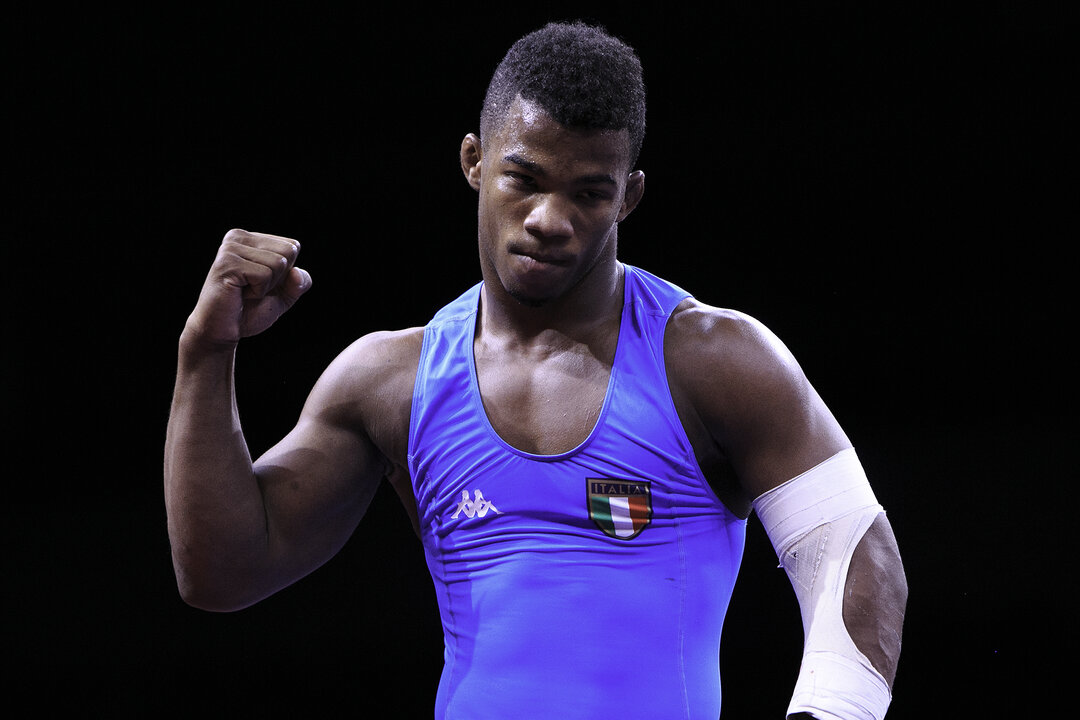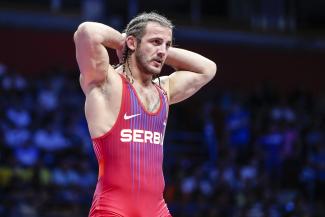Chamizo Outlasts Burroughs in Epic Shootout to Win Yasar Dogu Gold Medal
Saturday, July 28, 2018 - 17:26 By Eric Olanowski

ISTANBUL, Turkey (July 28) - Nearly four months ago, Jordan BURROUGHS (USA) posted a photo on Instagram with the caption “If you want to be the king, you have to beat the king.” Frank CHAMIZO (ITA) did just that on Saturday, getting his revenge against the London Olympic champion in front of a sold out Bağcılar Olympic Sport Hall in Istanbul, Turkey.
Chamizo, the two-time world champion was looking to avenge his loss to Burroughs from May’s Beat the Streets in New York City. In that match, Chamizo commanded the early 4-0 lead but was outscored 6-1 in the final four minutes of the bout, losing the match, 6-5.
Saturday’s bout kicked off a little differently than the outdoor “ice skating” match in New York, as Burroughs scored the match's first point, nearly grabbing a takedown from a low single, but settled for a step out point. The American coaching staff thought Burroughs should have been awarded the takedown and threw the challenge cube. The original call on the mat was confirmed, and Chamizo was awarded a point for the lost challenge, giving the Italian the 1-1 lead on criteria.
With 45 seconds left in the opening period, Burroughs, the four-time world champion picked up the pace and forced the referees to put Chamizo on the activity clock. The American shot a double, came up to a single and picked up step out point, taking the 2-1 lead into the final three minutes.
 df. KAYA (TUR)-3.jpg) Frank CHAMIZO (ITA) defeated five-time world and Olympic champion Jordan BURROUGHS (USA), 10-10 to win the Yasar Dogu. (Photo by Martin Gabor)
Frank CHAMIZO (ITA) defeated five-time world and Olympic champion Jordan BURROUGHS (USA), 10-10 to win the Yasar Dogu. (Photo by Martin Gabor)
Chamizo surrendered the bouts first takedown after Burroughs snagged his heavy stepping left foot with a low single, extending his lead to 4-1.
Down by three, Chamizo scored a reversal, cutting Burroughs’ lead to 4-2. But, not before the Italian corner threw the challenge cube, questioning if Burroughs secured the takedown before scoring the reversal. Once again, the referees came together and confirmed the call on the mat, awarding Burroughs a point for the lost challenge, giving him the 5-2 lead.
After giving up his second step out of the match, Chamizo, who is known for his defense scored his first takedown and cut the Olympic champions lead to 6-4 with one minute remaining in the final period.
The Cuban turned Italian increased his sense of urgency after Burroughs extended his lead to 8-4 with his second takedown of the bout.
Chamzio, with his cat-like reflexes, found himself fighting off a Burroughs double, but turned his defense into offense, exposing the American and picking up four points on the out of bounds line, ultimately taking the 8-8 lead on criteria.
The Rio bronze medalist closed out the bout with his third takedown and took the 10-8 lead. Burroughs would score the final two points, but Chamizo held criteria and was victorious, 10-10.
With that win, Chamizo evens up the series at one apiece. The next time these two could potentially meet would be in October at the 2018 World Championships in Budapest, Hungary.
RESULTS
57kg
GOLD - Thomas GILMAN (USA) df. Dzmichyk RYNCHYNAU (BLR), 12-5
BRONZE - Suleyman ATLI (TUR) df. Taras MARKOVYCH (UKR), 10-6
BRONZE - Vicky VICKY (IND) df. Armen ARAKELIAN (UKR), 9-7
65kg
GOLD - Mehran NASIRIAFRACHALI (IRI) df. Ali RAHIMZADA (AZE)
BRONZE - Madiyar BURKHAN (KAZ) df. Hassan MORADGHOLIEI (IRI), 14-9
BRONZE Daulet NIYAZBEKOV (KAZ) df. Andrii SVYRYD (UKR), 10 - 0
74kg
GOLD - Frank CHAMIZO MARQUEZ (ITA) df. Jordan BURROUGHS (USA)
BRONZE - Nurlan BEKZHANOV (KAZ) df. Saeid DADASHPOURKERIKALAEI (IRI), 4-4
BRONZE - Bolat SAKAYEV (KAZ) df. Nurykan AZAMAT (BLR), 3-2
86kg
GOLD - David TAYLOR (USA) df. Murad SULEYMANOV (AZE), via fall
BRONZE - Boris MAKOEV (SVK) df. Ahmet BILICI (TUR)
BRONZE - Fatih ERDIN (TUR) df. Omar ZIANTDINOV (RUS), 12-2
97kg
GOLD - Aslanbek ALBOROV (AZE) df. Mojtaba GOLEIJ (IRI), 10-0
BRONZE - Fatih YASARLI (TUR) df. Valerii ANDRIITSEV (UKR), 1-1
BRONZE - Kyle Frederick SNYDER (USA) df. Riza YILDIRIM (TUR), 11-0
Women’s Wrestling
50kg
GOLD - Oksana LIVACH (UKR) df. Sarra HAMDI (TUN), 10-0
BRONZE - Semkiv ILONA (UKR) df. Ritu RITU (IND), 13-7
BRONZE - Georgina Suzana SEICARIU (ROU) df. Ciricu EMILIA (MDA), 3-1
55kg
GOLD - Pinki PINKI (IND) df. Olga SHNAIDER (UKR), 6-3
BRONZE - Nurufe DUMAN (TUR) df. Siwar BOUSETTA (TUN), 8-0
59kg
GOLD - Olena KREMZER (UKR) df. Sofiia BODNAR (UKR), 4-2
BRONZE - Sangeeta BALALI (IND) df. Yuliya PISARENKA (BLR), 14-6
65kg
GOLD - Ilona PROKOPEVNIUK (UKR) df. Netreba IRYNA (AZE), 14-3
BRONZE - Geeta GEETA (IND) df. Sofiya Hristova GEORGIEVA (BUL), 3-0
BRONZE - Mariia ILCHYSHYN (UKR) df. Elis MANOLOVA (AZE), via injury
72kg
GOLD - Beste ALTUG (TUR)
SILVER - Rajni RAJNI (IND)
BRONZE - Neslihan ULUSOY (TUR)


Share your thoughts.
Comments